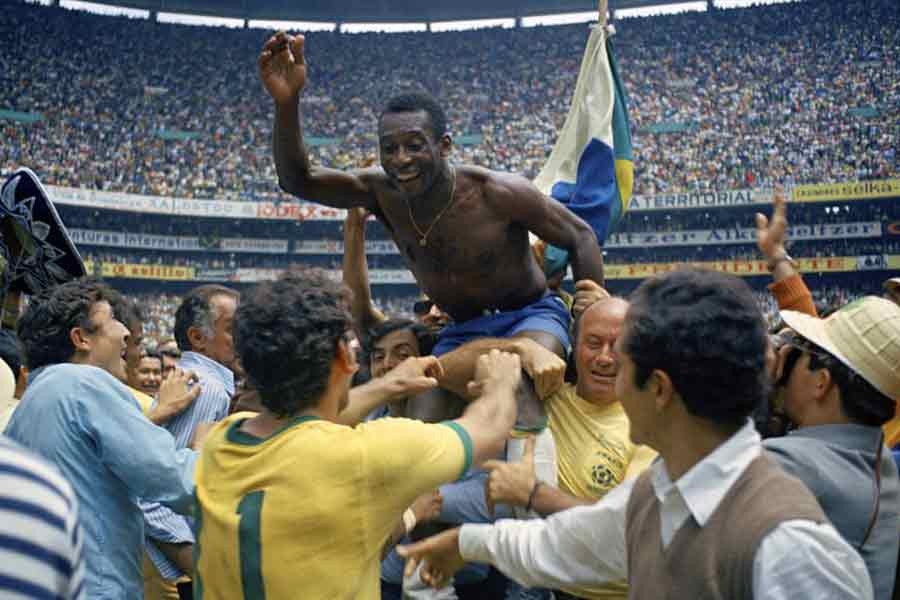Pele, the first God of Football, The King, the legend, the black pearl is no more. The King has walked his last walk to the eternal dressing room of the afterlife. A great player, a legendary sports personality has breathed his last. The game of football has reached to the epitome of our imagination and expanded its scope to the greatest influence than ever before. But with Pele gone, the game has reduced significantly, leaving a vacuum unrealisable.
Pele revolutionised football. Pele stopped a war. Pele united countries, united families. There was no race problem, language problem - these are some of the sentiments that 2002 World Cup winner Brazilian captain Cafu said about Pele, the one who personified the game of Football. Pele coined the nickname "The Beautiful Game" for Football, and it was he himself that exceptionally beautified the game. In fact, it wouldn't be wrong to say that when Pele was playing, he was the fame of the game, he was Football, personified. And continued to carry that legacy with him for as long as he lived.
Pele is spelled G-O-D. This comment of Pat Crerand brought the concept of sporting divinity in football. Pele truly encapsulated the concept of footballing divine, paving the way for others to the Hall of Football Divinity. This first God of Football has now passed away.
Pele glorified the game across the globe to newer heights. A stark example of it is his singlehandedly popularising the game in the US (soccer for them). He was dubbed 'The King' of New York, a title that he rightfully owned not only for New York but also for the whole of Football. Pele carried the gravitas without whose presence any great football event was incomplete. He was the oracle without whose endorsement, no one could even be considered for induction in the potential list of football greats.
The world has rarely witnessed a sports personality who has been discussed, revered, and doted on like Pele has been. Those born in the 70s grew up knowing Pele, a global icon of hope and confidence. His influence and impact on Brazil, Brazilians, and the marginalized of the entire world is unsurpassable. He was such an icon that the Brazilian Government endorsed him as a National Treasure. Pele's story was motivation for us Bangladeshis too; and, to the extent that his story was included in our primary textbooks even. Even though on the other end of the globe, Pele's story of transforming into the game's most prolific scorer and sporting hero motivated our youth of the '70s, '80s and '90s extensively.
He became the most recognisable figure in the world, extending the game's popularity to corners where it wasn't even considered a part of the sporting ecosystem. One has to admit that it was Pele who guided the US to fall in love with the The Beautiful Game that the North American still (wrongly I believe) refer to as Soccer. But the influence of his story of becoming the legend and icon that he is motivated and induced a sense of perseverance among those that were strained under burdens that life brings about, especially those who struggled to make ends meet. With our country's history and socio-economy during those decades, we can understand how Pele and his story resonated with our youth of that period. With that was added the healthy and sometimes nasty debate of who was the greatest - Maradona or Pele; a pivotal debate between Argentine and Brazilian football fans.
Every world cup we could somewhat see that our country would faction into two - Brazil and Argentina - especially after the 1986 world cup. Pele was not playing anymore, but his legacy thrived on, vividly and strongly, striving hard against the smarting attacks of anti-Brazilian taunts and jokes. Maradona's rise to football divinity was a great respite for us. However, Maradona's later career downturns never really allowed Maradona to attain the respect of a role model and idol that Pele had personified impeccably. Those who hate Brazil have to admit unabashedly that we never could muster the strength nor the justification for making any comment against Pele. Maybe we could debate via comparing his solo impact in the matches and for the team; we definitely would win a few pointers there given what Maradona had achieved in that category. We might even win a debate or two when it comes to flair and creativity with the ball. But, with everything else, beginning from his galvanizing and majestic presence, to his impact to and upholding of the sporting values, to the epitome of personality and character that Pele had built, we lost hands down.
Pele was a symbol of Brazil, a football icon, a role model for sports fans, and a face in the crowd struggling to reduce inequality in society. Not only was Pele a representation of social mobility, Pele was a symbol of melting racism. His economic and social status as a black man helped ease racial tensions in the world. Pele was truly The King, the first God of Football, who built the Hall of Football Divinity for all others to strive for. It must be reiterated that Pele personified Football in all of its diversity, scope, influence, fame, flair, competition, and everything else that the game signifies. Without Pele, society has lost a perfect archetype of change that society needs. With Pele, Football has lost the person who anthropomorphised the essence of The Beautiful Game.


